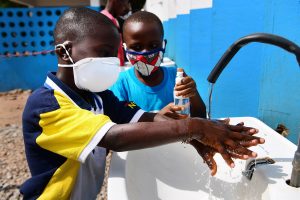
Frequent handwashing with soap is one of the most effective ways to stop the spread of coronavirus (COVID-19)
What is COVID-19?
Coronaviruses are a group of contagious, flu-like viruses. They cause symptoms that can be as mild as a common cold but in some cases can be fatal. COVID-19 is a new type of coronavirus that is spreading quickly around the world. Early symptoms include fever, cough and difficulty in breathing similar to other flu-like illnesses.
With specific treatments or a vaccine not yet available, preventing its spread from person to person is vital to reduce the outbreak’s impact on people’s lives, health, livelihoods and the healthcare systems we all rely on.
 Handwashing is key to preventing coronavirus
Handwashing is key to preventing coronavirus
Frequent, thorough handwashing with soap and water is one of the best ways to prevent the spread of infectious diseases, including COVID-19. Like a cold, coronaviruses are spread through droplets from a person coughing or sneezing, and potentially via contaminated surfaces. Good hygiene is key to avoid spreading it and catching it.
Along with other important behaviors, thoroughly washing hands often and at key moments is essential to controlling the pandemic. The graphic below shows six key steps you should take to reduce the risk of transmission of COVID-19 between people.
Two of these behaviors handwashing with soap and food hygiene are part of the regular hygiene promotion work we have done for decades. The other four are also important to protect people from COVID-19, and all must be adhered to for complete protection.
Impact of coronavirus where we work
In many low- and middle-income countries, high numbers of people do not have soap and water to wash their hands or clean with, and knowledge of how and why to wash hands properly is not widespread. In least developed countries, nearly 3 in 4 people have nowhere at home to wash their hands with soap and water. This creates a higher risk of illnesses and diseases spreading – including coronavirus.
The COVID-19 outbreak has so far mostly affected high-income countries, in many cases severely impacting on communities and healthcare systems. If it takes hold in low- and middle-income countries with limited water, sanitation and hygiene services, and where healthcare facilities and people are far less equipped to control or effectively treat infections, the consequences could be much worse. We will be working hard to help prevent the spread.
43% of healthcare facilities globally lack hand hygiene at the point of care where doctors and nurses are treating patients, and only 55% of healthcare facilities in least developed countries have a basic water service. To curb the spread of coronavirus in these countries, that must change.
What we are doing about coronavirus
Promoting good hygiene has been a core part of our work since Tan Water Foundation began. We are experts in working with governments, communities and partners to improve WASH facilities and instill hygiene behavior changes that mean people can get the most out of improvements.
In the face of the threat of coronavirus, we are scaling up our efforts to promote hygiene, including improving handwashing with soap. And we will be installing handwashing facilities in areas where people need them most, making it easier for them to keep their hands clean and protect themselves. This is the moment we all need to act together to change people’s hygiene behaviors for a generation on a massive scale.
We are using our expertise to provide technical support and advice to governments and government-led mechanisms to promote hygiene in countries where we work, campaigning to control or prevent the spread of COVID-19. At the heart of this will be promoting the importance of good hygiene to the public, including handwashing with soap, using digital and social media to amplify hygiene messages. To avoid spreading the virus ourselves, we will not carry out hygiene promotion in person within communities in the first phase of our response.
We will continue our ongoing hygiene behavior change work, supporting people in their homes, schools and healthcare facilities to improve habits so they can enjoy the full benefits of clean water and decent sanitation.
